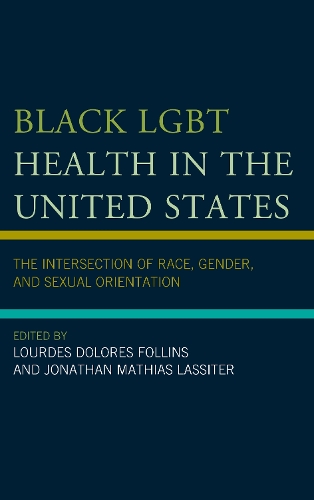
Black LGBT Health in the United States: The Intersection of Race, Gender, and Sexual Orientation
(Paperback)
Available Formats
Publishing Details
Black LGBT Health in the United States: The Intersection of Race, Gender, and Sexual Orientation
By (Author) Lourdes Dolores Follins
Edited by Jonathan Mathias Lassiter
Edited by Jonathan Mathias Lassiter
Contributions by Roberto L. Abreu
Contributions by Siobhan Brooks
Contributions by Dante' D. Bryant
Contributions by Lawrence O. Bryant
Contributions by Candice Crowell
Contributions by Sannisha K. Dale
Contributions by Lourdes Dolores Follins
Bloomsbury Publishing PLC
Lexington Books
4th December 2018
United States
Classifications
Professional and Scholarly
Non Fiction
Ethnic studies / Ethnicity
Sociology
Public health and preventive medicine
362.8960973
Physical Properties
Paperback
242
Width 151mm, Height 221mm, Spine 18mm
354g
Description
Black LGBT Health in the United States: The Intersection of Race, Gender, and Sexual Orientation focuses on the mental, physical, and spiritual aspects of health, and considers both risk and resiliency factors for the Black LGBT population. Contributors to this collection intimately understand the associations between health and intersectional anti-Black racism, heterosexism, homonegativity, biphobia, transphobia, and social class. This collection fills a gap in current scholarship by providing information about an array of health issues like cancer, juvenile incarceration, and depression that affect all subpopulations of Black LGBT people, especially Black bisexual-identified women, Black bisexual-identified men, and Black transgender men. This book is recommended for readers interested in psychology, health, gender studies, race studies, social work, and sociology.
Reviews
Lourdes Dolores Follins and Jonathan Mathias Lassiter offer us a long overdue treatment of Black LGBT health in the United States, one that doesnt shy away from our rich, varied, and intersectional tapestry by equally highlighting all constituents of the LGBT acronym. This offering honors all aspects of us through narratives, literature reviews, autoethnography, and both qualitative and quantitative methodologies that affirm our resilience as sexually and gender diverse descendants of the African diaspora. The words and recommendations provide us with considerations that highlight systems and affirmation, not just individual behaviors and pathology. The contributors to this collection paint a portrait of us, our communities, and our families as solutions instead of statistics. This book exalts our glorious resilience as Black LGBT and gender non-conforming peoples, and in doing so, provides us with a road map on how we can more effectively prioritize and celebrate our collective and individual health. -- David Malebranche, MD
Black LGBT Health in the United States advances our knowledge about Black LGBT communities who have experienced multiple forms of marginalization based on the intersection of racial, gender, social class, and hetero-normative hierarchies. This book engages with the complexities of examining core socio-structural barriers that influence disparate health inequities for Black LGBT communities. One of the major strengths of this work involves its interdisciplinary analytic frameworksincluding theory, methodologies, and praxisthat examine health inequities, as situated in the everyday experiences of Black LGBT communities. This book provides an innovative strength-based framework that examines the critical role of resiliency in transcending health inequities in Black LGBT communities, and integrates this knowledge with applications to larger societal contexts. The breadth of this scholarly work is superb in its exploration of innovative, culturally-grounded prevention strategies and community based programs that challenge health inequities and provide a more holistic understanding of Black LGBT communities. -- Leo Wilton, State University of New York at Binghamton
I am so grateful for this volume. It is one of many books that have been missing for so long in the literature. Its intentional focus on Black populations within the LGBT health realm is soul satisfying. I expect this volume will be tremendously helpful for professionals who serve those often rendered invisible. -- Michele K. Lewis, Winston-Salem State University
Author Bio
Lourdes Dolores Follins is associate professor at the City University of New York. Jonathan Mathias Lassiter is assistant professor of psychology at Muhlenberg College.
